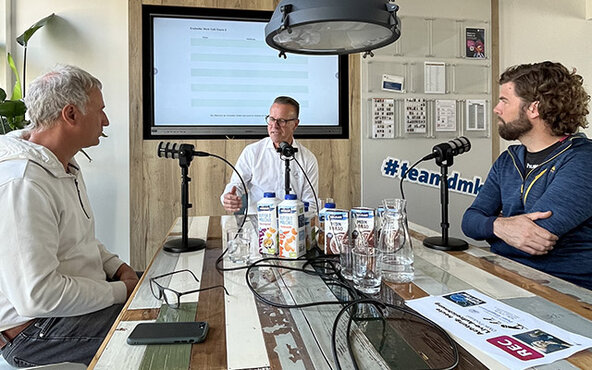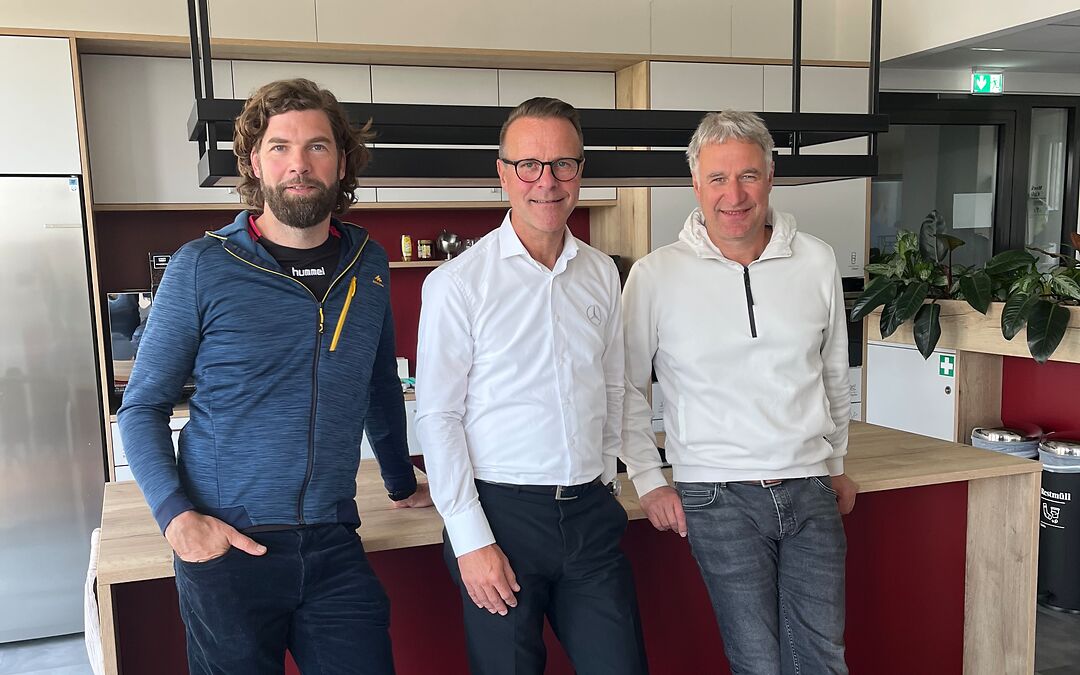
Making split-second decisions was a key challenge in Peter Gagelmann's former role as a Bundesliga referee. In the podcast "Denkfutter", the former referee talked with European football champion Marco Bode and DMK communications chief Oliver Bartelt about what he thinks it takes to make good decisions.
Communicating in a team
Decisions are a part of everyday business, not only in the professional life of a referee but also in companies. Whether it's about prioritising tasks, allocating project budgets or developing new products – employees and managers are constantly required to make well-informed and often quick decisions. The same holds true at DMK. This is about technical considerations, but also about responsibility, experience, and exchange within the team. For Peter Gagelmann, communication with his assistant referees was always crucial: "It's incredibly valuable to get a second opinion when you have a very short amount of time to make a decision." He adds: "Team spirit is one of the most important things for me. I can only make good decisions if I feel comfortable in the team, because, if it's a good team, if we harmonise, I can then make solid decisions." And then it's about taking responsibility for this decision as the main referee and also standing by it – no matter what happens on the pitch.
Gathering opinions
For managers in the company, this means: actively listening and incorporating the perspectives of employees into the decision-making process – without hiding behind them. A prerequisite for such decision-making processes is a strong culture of discussion, i.e., spaces in which people can speak openly without opinions being immediately evaluated or steered in a certain direction. Just as important is a healthy culture of handling mistakes. Incorrect decisions must not be seen as taboo but must be reflected on and used as learning opportunities. Peter Gagelmann puts it like this: "A referee leads his matches with his experience – and with the mistakes he's made. (…) It is important and crucial not to repeat these mistakes, but to learn from them. And sometimes, what seems like a mistake isn't actually one – it's just a matter of interpretation, emotion, or perception."
Preparing for the game
And there's something else that is needed to be able to make well-founded decisions, both on the pitch and in companies – and that's comprehensive preparation. "Referee teams prepare thoroughly for a match – for example, by looking at specific player matchups, whether any players have already received cautions, and other factors," explains Peter Gagelmann. But for him, preparation goes even further – it also means being ready to face criticism for the decisions he makes. "You walk onto the pitch with a rulebook, but you always have a certain amount of discretion. If I know what to expect after making a decision, if I'm prepared for it, then it's much more manageable."
Showing confidence
Of course, a certain amount of experience also helps in the decision-making process: for Peter Gagelmann, it's clear: "Experience is absolutely crucial, because it helps me make better decisions, if there is, indeed, such a thing as better and worse decisions." It's also about confidence though: "If I have the right body language, the right presence, and a reputation where people say, 'We trust him – he won't always get it right, but he'll do a good job overall', then I'm in a better place to make decisions", says Peter Gagelmann. Translated to a company like DMK, this means: you need the trust of stakeholders – like employees – to bring others along and involve them in the decision-making, enabling them to help shape the outcomes of those decisions.
Mustering up courage
The question remains: What constitutes a good decision and what constitutes a bad one? And who even decides what is right and wrong? For Peter Gagelmann, it's clear: "Life isn't just black and white, but sometimes it's very light grey and sometimes very dark grey." Every decision involves opportunities and risks, and that's why decisions also require courage – the courage to choose one path and to shape it together with the team.

